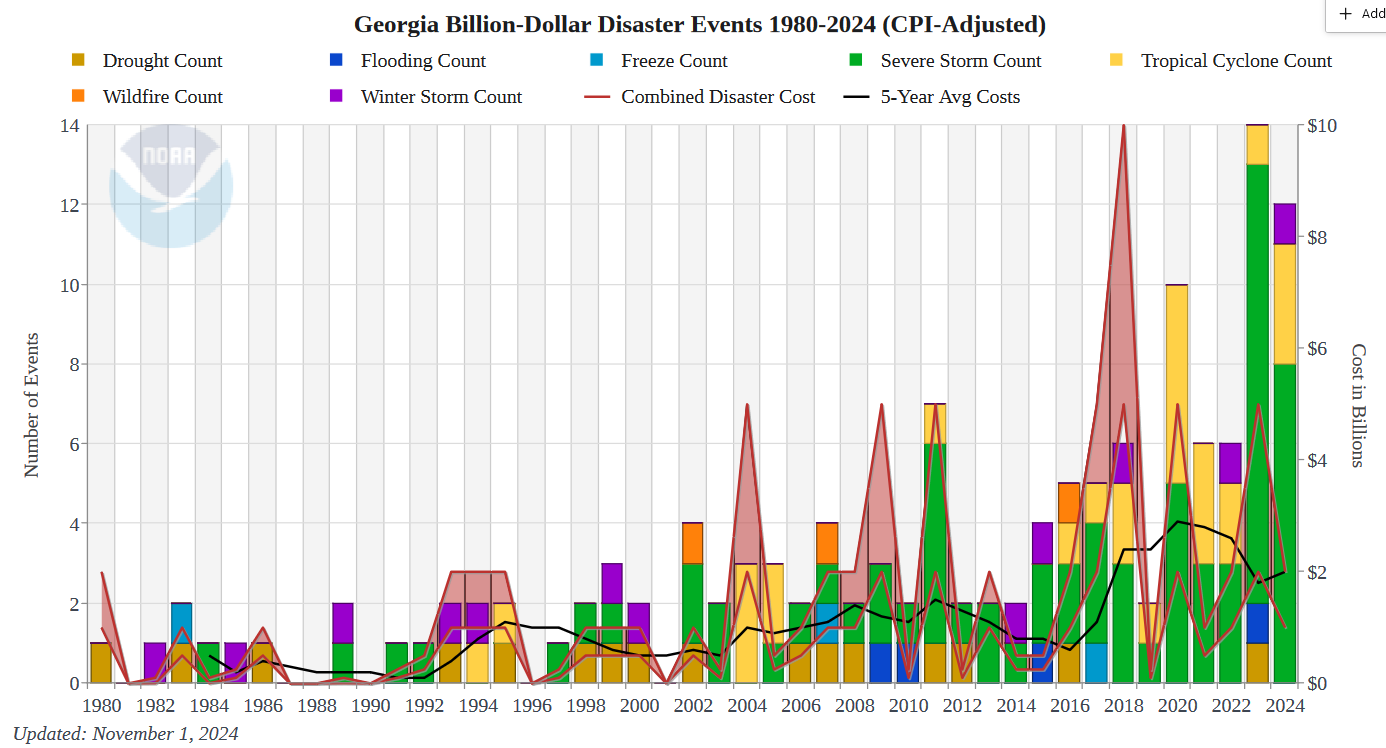The Impact of Climate Change on Georgia’s Weather
Climate change is undeniably altering weather patterns, making extreme weather more frequent and severe. Over the past five years, Georgia has experienced an alarming increase in hurricanes, storms, and flooding. The Atlanta Metropolitan area has been particularly hard hit. These extreme weather events have caused significant damage to both businesses and homes.
According to recent data from the National Oceanic and Atmospheric Administration (NOAA), Georgia has seen an increase in the frequency and intensity of hurricanes and storms.
Climate Disasters Hit Georgia From 1980–2024
From 1980–2024 (as of November 1, 2024), there have been 133 confirmed weather/climate disaster events with losses exceeding $1 billion each to affect Georgia. These events included 16 drought events, 4 flooding events, 3 freeze events, 68 severe storm events, 27 tropical cyclone events, 3 wildfire events, and 12 winter storm events. The 1980–2023 annual average is 2.8 events (CPI-adjusted); the annual average for the most recent 5 years (2019–2023) is 7.6 events (CPI-adjusted).

The state’s geography makes it susceptible to flooding, exacerbated by rising sea levels and increased rainfall. This new normal poses a considerable challenge to the state’s infrastructure and economy.
Flood Damage in Georgia (2019-2024)
From 2019 to 2024, Georgia has suffered substantial flood damage. Hurricanes like Michael and Dorian have left a trail of destruction. The economic impact on businesses has been severe, with many suffering extensive property damage and financial losses.
- Statewide Damage: Estimates from the Georgia Emergency Management and Homeland Security Agency (GEMA/HS) indicate that flooding has caused $1.0 billion to $2.0 billion in damage statewide
- Business Losses: Numerous businesses have faced significant disruptions, with property damages leading to prolonged closures and financial strain.
- Damage to Homes: Residential areas have not been spared. Many homes have experienced severe flooding, leading to costly repairs and temporary displacements.
Select Time Period Comparisons of Georgia Billion-Dollar Drought, Flooding, Freeze, Severe Storm, Tropical Cyclone, Wildfire, and Winter Storm Statistics (CPI-Adjusted)
| Time Period | Billion-Dollar Disasters | Events/Year | Cost | Percent of Total Cost |
| 1980s (1980-1989) | 9 | 0.9 | $2.0B-$5.0B | 7.7% |
| 1990s (1990-1999) | 14 | 1.4 | $5.0B-$10.0B | 14.8% |
| 2000s (2000-2009) | 25 | 2.5 | $10.0B-$20.0B | 23.0% |
| 2010s (2010-2019) | 37 | 3.7 | $10.0B-$20.0B | 33.3% |
| Last 5 Years (2019-2023) | 38 | 7.6 | $5.0B-$10.0B | 19.2% |
| Last 3 Years (2021-2023) | 26 | 8.7 | $5.0B-$10.0B | 12.4% |
| Last Year (2023) | 14 | 14.0 | $2.0B-$5.0B | 6.9% |
| All Years (1980-2024)* | 133 | 3.0 | $20.0B-$50.0B | 100.0% |
Cost statistics not included for Hurricane Milton (August 2024), Hurricane Helene (September 2024)
The Atlanta Metropolitan area, a hub for businesses and residences, has faced similar challenges. The region has seen severe flooding, damaging commercial properties and homes alike. The economic toll on businesses has been particularly pronounced, affecting local economies and livelihoods.
Future Climate Expectations for Georgia
Looking ahead, climate projections suggest that Georgia will continue to face rising temperatures and more extreme weather events. According to the Intergovernmental Panel on Climate Change (IPCC), the southeastern United States, including Georgia, will experience increased rainfall and more frequent and intense hurricanes.
- Projected Climate Changes: Warmer temperatures and increased precipitation are expected, leading to more severe flooding and droughts.
- Dangers: The increased risk of extreme weather events poses a significant threat to Georgia’s infrastructure and economy.
Measures by the Governor of Georgia
In response to these challenges, the Governor of Georgia and his administration are taking proactive measures to limit the impact of flooding on both businesses and residents.
- Current Actions: The state has implemented stricter building codes and zoning laws to reduce flood damage. Investments in infrastructure improvements, such as flood defenses and drainage systems, are also underway.
- Future Plans: The administration is focusing on long-term strategies to mitigate the impacts of climate change, including enhancing emergency response capabilities and promoting sustainable practices.
Importance of Plumbing and Water Restoration Businesses
In these challenging times, plumbing and water restoration businesses play a crucial role in helping communities recover from extreme weather events. Having a trusted company on speed dial can make all the difference.
- Immediate Response: Quick action can prevent further damage and reduce recovery costs. Trusted companies provide 24/7 emergency services to address urgent issues.
- Key Services:
- Water Damage Restoration: Essential for mitigating flood damage and preventing mold growth.
- Plumbing Repairs: Fixing burst pipes and other plumbing issues caused by storms.
- Modern Equipment: Using advanced technology for efficient and effective restoration.
- Licenses and Certifications: Ensure the company is qualified and adheres to industry standards.
- Respectful and Quality Service: Professionalism and customer care are vital, especially during stressful times.
Choosing a local company familiar with the area’s specific challenges can provide added benefits. Local expertise means understanding the common issues faced by residents and businesses, leading to quicker and more effective solutions.
Enhancing Community Resilience through Expert Services
As Georgia continues to face the challenges of extreme weather due to climate change, the role of plumbing and water restoration businesses cannot be overstated. These companies provide essential services that help communities recover and rebuild. By choosing a reliable and experienced company, residents and businesses can better navigate the impacts of severe weather, ensuring quicker recovery and greater resilience.
Sources: National Oceanic and Atmospheric Administration (NOAA)

